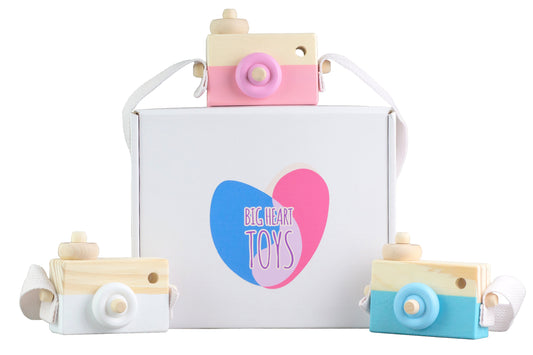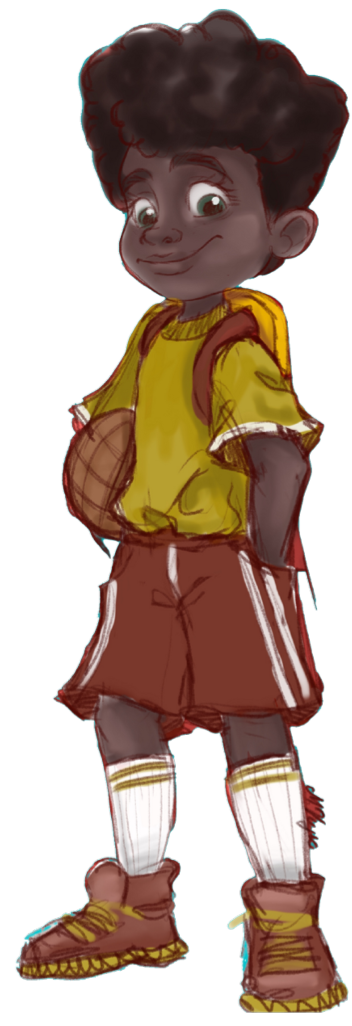Abstract thinking is the mental process of conceptualizing ideas that transcend the real world. It involves the ability to grasp concepts, patterns, and relationships that aren't directly observable. This type of thinking enables individuals to analyze, synthesize, and manipulate information on a higher level, leading to enhanced problem-solving skills, creativity, and critical reasoning.
In daily life, abstract thinking allows us to understand metaphors and symbolism, as well as make connections between seemingly unrelated concepts. Abstract thinking also plays a crucial role in cognitive development, promoting growth by encouraging little ones to think beyond the surface, question assumptions, and explore new perspectives.
Abstract Thinking vs. Concrete Thinking
Abstract thinking and concrete thinking are two distinct processes that influence how people understand and interact with the world around them.
The concrete thinking process is grounded in literal interpretations and tangible experiences, the “here and now.” It involves understanding things based on their physical attributes and immediate sensory perceptions. For example, a concrete thinker might see a tree and only focus on its size, shape, and color without delving into broader concepts like the environment's impact on the tree or the tree's symbolic significance.
On the other hand, abstract thinking involves conceptualizing ideas beyond the immediate sensory experience and seeing the bigger picture. It entails grasping concepts, relationships, and meanings that may not have a direct physical manifestation. Abstract thinkers can comprehend metaphors, symbols, and complex theories, drawing connections between seemingly unrelated concepts and thinking critically about intangible things like love or friendship.
While both types of thinking have their place, abstract thinking is crucial for higher-order cognitive abilities such as problem-solving, creativity, and philosophical questioning. Concrete thinking is foundational, providing a practical understanding of the world. Abstract thinking expands our intellectual horizons, allowing us to explore life’s complexities and contribute to the advancement of knowledge and ideas.
Abstract Thinking in Neurodivergent Children
Neurodivergent children, including those with conditions such as autism spectrum disorder (ASD), learning disabilities, and various mental health conditions, often navigate a distinct path in developing abstract thinking skills. Abstract thinking involves comprehending concepts beyond immediate sensory input, a cognitive process that can be influenced by neurological differences.
For children on the autism spectrum, abstract thinking might pose challenges due to a tendency toward concrete thinking and difficulty with interpreting non-literal language. However, this doesn't mean they lack abstract thinking altogether. Many exhibit strengths in focused areas and may develop unique strategies to navigate abstract concepts.
Learning disabilities can also affect the development of abstract thinking. Difficulties in reading, writing, or mathematical reasoning can impact a child's exposure to abstract ideas. Tailored approaches that incorporate visual aids, hands-on activities, and individualized learning plans can help bridge the gap.
Psychologist Jean Piaget's theory of cognitive development, particularly the "formal operational stage," sheds light on abstract thinking. This stage, typically reached during adolescence, involves the ability to think abstractly, reason hypothetically, and consider multiple perspectives. While neurodivergent children might not follow Piaget's stages linearly, they can still progress in uniquely meaningful ways.
Recognizing and nurturing the abstract thinking potential in neurodivergent children is crucial. By embracing their strengths, providing targeted support, and celebrating their individual growth trajectories, we can help them unlock their full cognitive potential and contribute their distinct perspectives to the diverse tapestry of human thought.
The Role of Physical Objects: Blocks and Cubes
Building blocks and cubes, while seemingly simple objects, play a pivotal role in fostering abstract thinking abilities in young children. While these toys are tangible and concrete, they hold the potential to spark and nurture abstract cognitive processes in remarkable ways.
Interacting with blocks and cubes encourages children to engage in spatial reasoning, problem-solving, and imaginative play. As they manipulate these objects, they begin to understand concepts like balance, stability, and symmetry. These foundational experiences lay the basis for more advanced abstract thinking.
When children stack blocks to create a tower, they're not just arranging objects — they're experimenting with concepts of height, weight distribution, and stability. As they combine blocks of different shapes to construct imaginative structures, they explore how different materials can work together. Such activities lay the groundwork for abstract thought by encouraging children to visualize possibilities, plan ahead, and analyze outcomes.
As children engage in collaborative block play, they learn the art of negotiation and compromise, navigating social interactions while contemplating shared goals. They develop the ability to see a single object as part of a larger structure, honing skills in recognizing patterns and connections, which are crucial aspects of abstract thinking.
The seemingly basic act of playing with blocks and cubes serves as a precursor to higher-order cognitive processes. By encouraging children to manipulate and experiment with these objects, we pave the way for the development of abstract thinking abilities that will shape their problem-solving skills, creativity, and critical reasoning in the years to come.
How Can Big Heart Toys Blocks Help With Abstract Thinking?
Our new 3D building blocks provide a unique building experience that can help your child develop their abstract thinking skills in their day-to-day life. Each three-dimensional cube has an abstract image that can be arranged into different designs and patterns. While the tactile play provides an engaging sensory experience, the solitary abstract shapes open their minds to different possibilities.
Abstract blocks provide opportunities for problem-solving, enhance creativity skills, and teach the concept of patterns and recreating images. These building blocks allow for both independent play and the opportunity for you to play with your child.
When building together, it can help to narrate what you’re creating with the abstract images. By showing your child what you can create and how to view things from different perspectives, you are modeling the ability to think outside the box.
Once your child is ready to play and build independently, you will be shocked at the magic their little minds are able to produce. When watching your little one create pictures and abstract designs, you may notice that they are learning to emotionally regulate themselves.
Creating abstract structures induces a sense of calmness through the unrestricted channeling of imagination and creativity, offering an escape from the constraints of routine. The absence of strict rules or predefined outcomes in abstract creation provides a judgment-free space, eliminating the pressure associated with conventional tasks.
Benefits of Abstract Thinking
First and foremost, abstract thinking is a powerhouse for problem-solving skills and decision-making enhancements. It equips individuals with the ability to understand complex scenarios, identify patterns, and draw connections between seemingly unrelated factors. This skill set empowers efficient and effective solutions to challenges, from daily problems to intricate puzzles.
Moreover, abstract thinking is the cornerstone of divergent thinking, critical thinking, and creative thinking. It encourages individuals to explore various angles, imagining multiple solutions to a single issue. This capacity for divergent thinking opens pathways to innovation and novel approaches.
Beyond individual growth, abstract thinking plays a crucial role in understanding different perspectives and seeing the big picture. It enables empathy by encouraging individuals to step into others' shoes, appreciate varied viewpoints, and foster open-mindedness. This ability to navigate complexities is particularly essential in our interconnected world, promoting effective communication and collaboration across diverse cultures and contexts.
In essence, abstract thinking unlocks a cascade of benefits. It empowers us to solve problems creatively, make sound decisions, and embrace a comprehensive view of the world.
Challenges in Abstract Thought Processes
Abstract thought processes, while powerful, can also give rise to a range of challenges that impact individuals' mental well-being and cognitive functioning.
One common challenge is rumination or overthinking, where individuals become entangled in repetitive, often negative thoughts. Abstract thinking's ability to delve deeply into concepts can lead to dwelling on things, which, if unchecked, may increase stress and anxiety.
Mental health implications are intertwined with abstract thinking. For instance, individuals prone to rumination may experience heightened levels of anxiety and depression. Additionally, overemphasis on abstract thoughts can contribute to feelings of isolation as intricate ideas might be hard to convey to others.
A significant connection exists between abstract thought and conditions like traumatic brain injury (TBI) — specifically, TBI can lead to difficulties in abstract thinking. Individuals may struggle to comprehend complex concepts or plan for the future, contributing to frustration or feelings of inadequacy.
Navigating these challenges requires a balanced approach. Cognitive strategies like mindfulness can help manage these potential downfalls. For mental health, it's crucial to recognize when abstract thinking takes a toll and to seek appropriate support. For TBI, tailored cognitive rehabilitation can aid in rebuilding abstract thinking skills, enhancing both cognitive and emotional recovery.
Tools and Techniques To Enhance Abstract Reasoning
-
Analogies: Analogical reasoning involves identifying relationships between different concepts. Engaging in analogy exercises, where individuals relate similar patterns across diverse scenarios, sharpens abstract thinking by encouraging the recognition of underlying connections.
-
Crossword Puzzles: Crosswords necessitate lateral thinking, where individuals deduce words from limited clues. Solving these puzzles strengthens cognitive flexibility and abstract reasoning, requiring the ability to manipulate letters and words in unconventional ways.
-
Mind Mapping: Creating visual mind maps to represent complex ideas fosters abstract thinking. This technique encourages individuals to break down concepts into interconnected nodes, enhancing comprehension and analytical skills.
-
Visual Arts and Music: Engaging in artistic pursuits, like painting or playing a musical instrument, nurtures abstract thinking. These activities encourage the interpretation of abstract concepts, such as emotions or ideas, through non-verbal means.
-
Chess and Strategy Games: Games that demand strategic planning, like chess or strategic board games, boost abstract reasoning. Players must anticipate future moves, analyze patterns, and adapt to evolving situations.
Incorporating these tools, techniques, and intelligence tests into learning and daily routines can cultivate robust abstract reasoning skills. As individuals train their minds to navigate intricate concepts, they enrich their problem-solving skills, creativity, and critical thinking capacities.
Abstract Thinking in Daily Life
Children, too, possess the capacity for abstract thinking, and their imaginative minds often shine in surprising ways. When a group of students collaborates on a school project, and they seamlessly combine unrelated elements like art, science, and storytelling to present a comprehensive narrative, they are using the skill of abstract thinking to turn ideas into a cohesive whole.
In mathematics, a child might recognize patterns across numbers, leading them to understand the concept of multiplication as a condensed form of addition. This insight showcases how abstract thought aids in comprehending complex mathematical relationships.
As children encounter abstract art, they embrace creativity without boundaries. They interpret emotions and concepts through color, shape, and form, demonstrating how abstract thinking lets them explore feelings beyond words.
Fostering abstract thinking in children equips them with tools for a lifelong journey of learning.
Concrete Actions To Foster Abstract Thought in Children
You can integrate day-to-day activities that spark abstract thinking. Encourage children to explore diverse perspectives, whether through discussing varying viewpoints on current events or immersing themselves in books with complex themes. Promote open-ended questions during conversations, inviting them to ponder "what if" scenarios and envision creative solutions.
By weaving these practices into their routines, children develop the cognitive flexibility and analytical skills needed to thrive in a complex world.
Working To Improve Abstract Thought Processes
Nurturing abstract thinking skills leaves a lasting imprint. Armed with the ability to see beyond the surface, they approach life's complexities with a holistic perspective. It empowers them to dissect complex problems, recognize hidden patterns, and envision innovative solutions.
For interactive stories, toys, and props that can help foster abstract thinking, check out the Big Heart Toys collection.
Sources:
Piaget's Formal Operational Stage | Definition & Examples | Simply Psychology
Psychiatry.org | Rumination | A Cycle of Negative Thinking | Psychiatry
Traumatic Brain Injury (TBI) | National Institute of Neurological Disorders and Stroke






